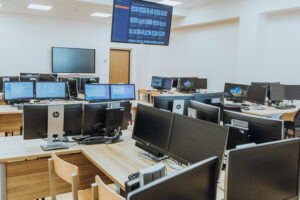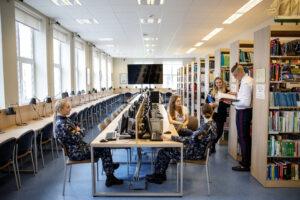
FOR QUESTIONS REGARDING STUDY PROGRAMMES, PLEASE CONTACT:
Room 114
Phone: 8 46 397 255
Mobile Phone: +370 692 83 739
Department of Port Engineering Vilma Locaitienė
E-mail: vilma.locaitiene@vilniustech.lt
Room: 114
Phone: +370 46 397 255
Mobile Phone: +370 692 83 739
Administrator Asta Raudienė
E-mail: asta.raudiene@vilniustech.lt
a
The modern chain of global supply logistics is inevitably related to the fourth industrial and technical revolution: for this reason, the latest digital technologies of the Internet of Things are being implemented into all processes, and fully automated shipping and logistics segments are also being developed and implemented.
More information in the AIKOS
(Full-time studies)
(Part-time studies)



The lecturers are researchers, scientists and practitioners in the field of information systems architecture, robotics, programming, shipping, seaport technologies, international logistics, port management, and maritime economics, who base their knowledge on the experience of professional activities in port companies.
CAREER
Specialist of a shipping and logistics information systems data analytics can work in shipping companies, various transport system, logistics, manufacturing and business companies, seaport, as well as information and communication technology companies. These specialists as data analysts can forge a successful career in shipping and logistics organizations of private and public sector, while the acquired knowledge and competences can be used in other fields as well – ensuring state cyber security or the security of business information systems, financial and insurance markets, public sector (health, education, transport, and other) companies, as well as in the field of law.
Graduates can engage in professional activities in the field of designing and developing IT solutions for the maritime transport and logistics industries and in the field of implementation of these solutions for companies in the shipping and logistics industry.
GOAL OF THE STUDY PROGRAMME
To prepare a bachelor specialist of computer science who is able to know and apply the laws of mathematics and computer science when processing data stored in shipping and logistics information systems.
– Analyze and model shipping and logistics business solutions and alternatives, using data flow analysis methods, modern programming and modelling tools, for simulation modelling, based on data from shipping and logistics information systems, including sets of big data;
– Foster a culture of ethical, safe and fair use of shipping and logistics information systems and the data stored therein, and views on values in the context of internationality and lifelong learning.
WHY CHOOSE THIS STUDY PROGRAMME?
Broad career opportunities: specialist of a shipping and logistics information systems data analytics can work in shipping companies, various transport system, logistics, manufacturing and business companies, seaport, as well as information and communication technology companies. These specialists can establish successful careers as data analysts beyond the shipping and logistics organizations of the private and public sectors, as the acquired knowledge and competences can be used in other fields as well – ensuring state cyber security or the security of business information systems, financial and insurance markets, public sector (health, education, transport, and other) companies, as well as in the field of law.
The only interdisciplinary study programme in Lithuania provides knowledge and competences not only in information systems, but also in the subject areas of shipping and international logistics. The gap between programmers and heads and managers is currently increasing, so graduates of this programme will be able to reduce that gap by using the acquired knowledge and skills of programming, data analytics, logistics chain management, applying the principles of big data processing and supporting artificial intelligence plug-ins when developing the idea of digital twins in shipping and logistics.
During studies, students learn to work with Python and R/R-Studio programming tools. These programming tools have highest demand for information systems data analytics. Studies of shipping and logistics information systems combine knowledge and competences in the fields of computer science, mathematics, shipping and logistics into a single whole, and the acquired knowledge and professional competences are applied to solve the optimization problems of business processes and technological solutions of shipping and the entire chain of global logistics.
INTERNSHIP
Graduation professional internship of shipping and logistics information systems is done in the 3rd year. The duration of the internship is 4 months. The advantage of this internship is that students have the opportunity to delve into a specific, narrower field of shipping and logistics processes by choosing: shipping information systems data analytics; intermodal logistics information systems data analytics; shipping and logistics company business process analytics; shipping and logistics information systems and programs data analytics; shipping and logistics technological processes data analytics.
Internship placement for data analysis of shipping and logistics information systems include: shipping, maritime cargo, maritime industry logistics, transport, cargo freight forwarding, ship and shipping line agency, or other maritime industry companies of related activities, or companies related to the activities of this industry. Many places for internship can be found in the online company database of Klaipėda State Seaport.
CONTINUITY OF STUDIES
Graduates can continue their studies in the second cycle in the field of computer science studies or in related fields, such as social sciences, business and public management, etc., depending on the requirements of the higher education institutions offering these studies.
ENVIRONMENT OF STUDIES
Studies take place in a modern environment that meets international requirements. Students can use a modern library rich with the latest scientific and informational publications, and also have access to the internal digital teaching/learning environment and digital resources of the academy.
The Experimental Large-Scale Dataset Generation and Shipping and Logistics Process Modelling modules are practiced in the LAJM’s specialised simulators: the Multifunctional Navigation Simulator, the Ship’s Power Plant Simulator, the Marine Cargo Information Systems Simulator, and the Seaport Cargo Terminal Management Simulator. This allows students to get acquainted with real processes in shipping and logistics and to learn how to solve optimisation problems of a specialised nature.
LMA is equipped with sports halls and gyms, which are intended for optional sports, physical education classes, sports competitions, sports and other events in which students of all study programmes participate. They can also spend their free time in these facilities.



SUBJECTS OF STUDY PROGRAMME
| 1st SEMESTER | CREDITS (ECTS) |
|---|---|
| Foreign Language of Computer Science | 10 |
| Basics of Mathematical Analysis | 10 |
| Technological Basics of Information Systems | 10 |
| 2nd SEMESTER | CREDITS (ECTS) |
|---|---|
| Harmonious Development of International Logistics | 10 |
| Mathematical Logic and Statistics | 10 |
| Algorithms and Data Structures | 10 |
| 3rd SEMESTER | CREDITS (ECTS) |
|---|---|
| Mathematical Optimization Methods | 10 |
| Infrastructure of the Logistics Chain | 10 |
| Logistics Chain Management and Economics | 10 |
| 4th SEMESTER | CREDITS (ECTS) |
|---|---|
| Mathematical Methods of Forecasting | 10 |
| Simulation Modelling | 10 |
| Basics of Artificial Intelligence | 10 |
| 5th SEMESTER | CREDITS (ECTS) |
|---|---|
| Formation of an Experimental Large-scale Data Set | 10 |
| Modelling of Shipping and Logistics Processes | 10 |
| 6th SEMESTER | CREDITS (ECTS) |
|---|---|
| Graduation Professional Internship of Data Analysis of Shipping and Logistics Information Systems | 30 |
| Thesis of the Professional Bachelor | 10 |
ADVANTAGES OF STUDIES IN LITHUANIAN MARITIME ACADEMY:
• Student leisure area
• Higher education high quality studies in Europe
• Worldwide benchmarked marine and onshore study programmes
• Prestige and quality
• Study mobility in more than 60 higher education institutions and Partners in Europe in frame of Erasmus+ programme
• Training using modern simulators
• Studies and practice in strong cooperation with maritime industry
• The uniqueness of studies is links with global maritime industry – guest Lecturers are invited from various port companies, field trips are organised
• Research and practice are provided



